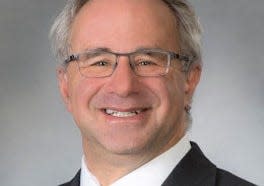Guest: Expanding early childhood education is urgent as poverty increases
The U.S. Census Bureau recently released alarming data: Poverty nationwide rose for the first time in 13 years, affecting more than 37 million people across the U.S. But the challenge is particularly acute among children, with poverty doubling and reaching a new record high last year. Here at home, one in five Oklahoma children live at or below the poverty line, one of the highest rates in the country.
We, as a society, are defined by how we serve our most vulnerable — our children — and this data presents an urgent need for policymakers to disrupt and prevent the cycle of poverty from continuing. But how do we do it?
There are effective, research-based, commonsense solutions. It starts with dramatically expanding high-quality early childhood education across Oklahoma and the nation. Here’s why.
When the Head Start program was launched in 1965, it provided early childhood education to low-income 4-year-old children for the first time. Academic research conducted over the coming decades provided proof that not only did this approach benefit the children academically, but it also paid off economically. In the 1970s, the Abecedarian Project, a significant longitudinal study, found that low-income children receiving high-quality education from infancy to age 5 outperformed peers in cognitive tests and saw academic benefits as teenagers. Then, in the late 1990s and early 2000s, Nobel laureate economist James Heckman showed that high-quality early education for 0–3-year-olds yields a 13% Return on Investment (ROI) due to lifelong benefits, such as improved education and health outcomes, less crime and increased income.
Fast-forward to today, and groundbreaking new research shows us that while Head Start’s approach is important, early education cannot wait until age 4; it should start at birth. A study released by the University of Oklahoma-Tulsa shows the nation needs a fundamental reset in its approach to early learning.
This longitudinal study, the first of its kind since the 1970s, reveals lasting academic gains among children living below the poverty line who started high-quality programs at 18 months. Compared to a control group of children with some or no early learning exposure, those attending a holistic early childhood center outperformed in language, reading and math from kindergarten through at least the third grade.
The study even shows that children below the poverty line who attend holistic early education programs perform at the national academic average of all children — affluent and not — through third grade. This research is proof that the achievement gap between lower- and higher-income children can be eliminated. Early education, starting in infancy and through third grade, is the policy antidote to prevent academic proficiency gaps — an increasingly important goal in the fact of Oklahoma’s rising poverty.
Unfortunately, early education policy actions lag behind both the science and societal needs. Many states maintain a hodgepodge of unconnected child care settings with no clear early learning strategy, let alone one rooted in promoting academic rigor. And as a country, we chronically underinvest. Consider this: Head Start’s budget is roughly $12 billion, but only $3.7 billion is dedicated to Early Head Start, which was only launched in 1994 and infused with significant funding just a decade ago.
In Oklahoma, successive governors and Legislatures have answered this call by investing in the Oklahoma Early Childhood Program, which supports infants and toddlers in high-quality classrooms in Oklahoma City, Tulsa and around the state. This effort benefits greatly from philanthropic funds in addition to the state budget. It’s a model program that achieves outstanding results but needs ongoing and increased investment.
Policymakers in Washington also can learn from Oklahoma’s example by doubling Early Head Start funding from $3.7 billion to $7.4 billion. It’s a small investment in terms of the overall federal budget. It could give close to 200,000 children from low-income families more opportunities and change life trajectories.
Next, we must reimagine the educational continuum as a nation — helping low-income families access high-quality early learning from infancy for optimal success. Our focus on education should start the moment a child is born — not just in elementary school.
We also need to attract more people to the early learning profession, offering real support and professional development. Child care educators deserve not just fair pay, but the professionalism afforded to other jobs where the stakes are so high and the impact so great.
And importantly, programs should be all-day and year-round, not just part-time. Stable, supportive and responsive care meeting family work schedules is crucial for children to thrive.
The economy demands it. But more importantly, the science calls for it.
Because for us to lead the world economically in this generation and the next, for America to disrupt the cycle of intergenerational poverty and become a nation where every child has a fair shot, we must align policy and practices with research.
And the research is telling us unequivocally: We need to start learning at birth.

Ken Levit is executive director of the George Kaiser Family Foundation.
This article originally appeared on Oklahoman: Expanding high-quality early childhood education urgent in Oklahoma
